What is a Solution Architect? Role, Skills & Career Path
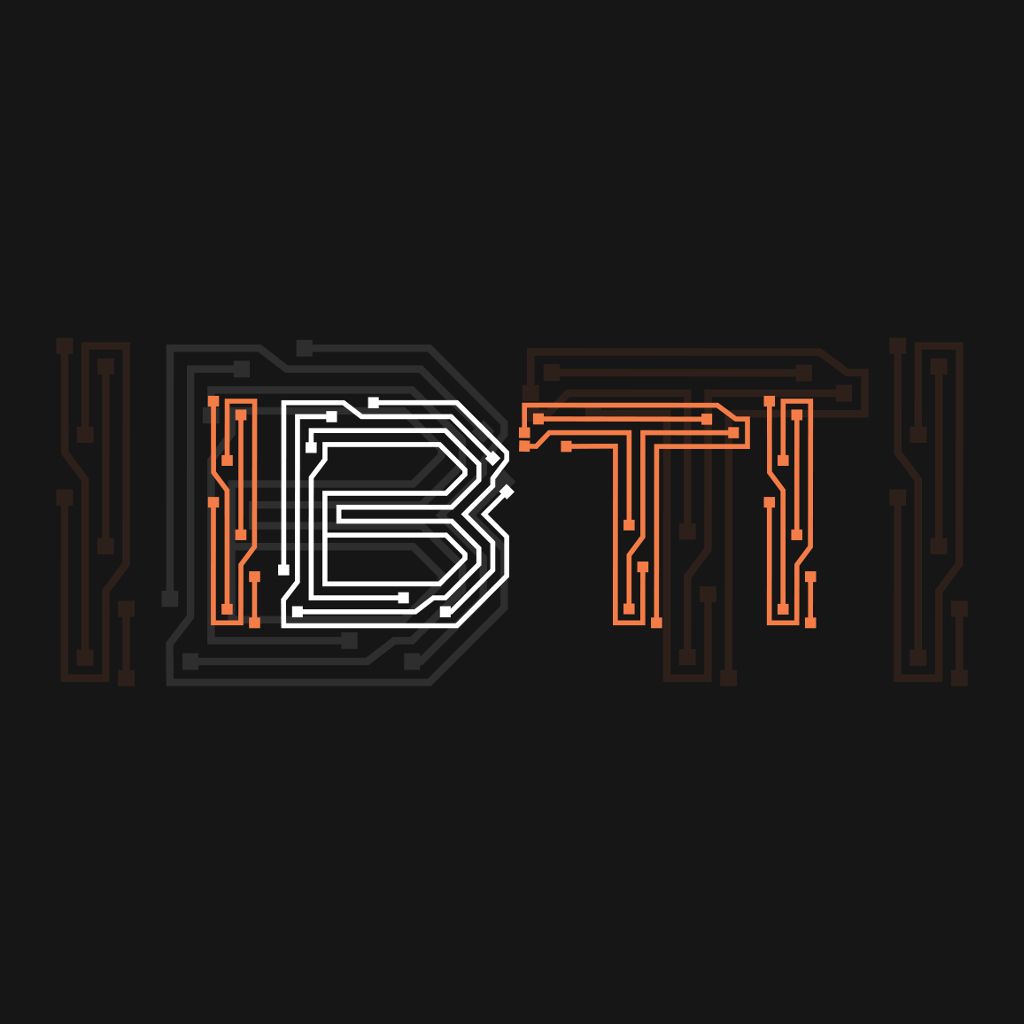 Marketing IBTI#Marketing IBTI
Marketing IBTI#Marketing IBTI
In today’s complex IT landscape, the role of a Solution Architect is crucial for bridging the gap between business needs and technology solutions. But what exactly does a Solution Architect do, and what skills are needed to excel in this role? This guide will explore everything you need about Solution Architects, including their responsibilities, skills, and how to embark on a career in this field.
What is a Solution Architect?
A Solution Architect is a professional who designs and manages the implementation of complex IT systems. They ensure that technology solutions align with business goals, making sure that all system components work together efficiently and effectively. Think of them as the strategic planners of IT projects, ensuring that every technical decision supports the organization's broader objectives.
What Does a Solution Architect Do?
Solution Architects are pivotal in transforming business requirements into effective technology solutions. Their role encompasses several vital activities, each crucial for the success of IT projects. Here’s a more detailed look at what Solution Architects do:
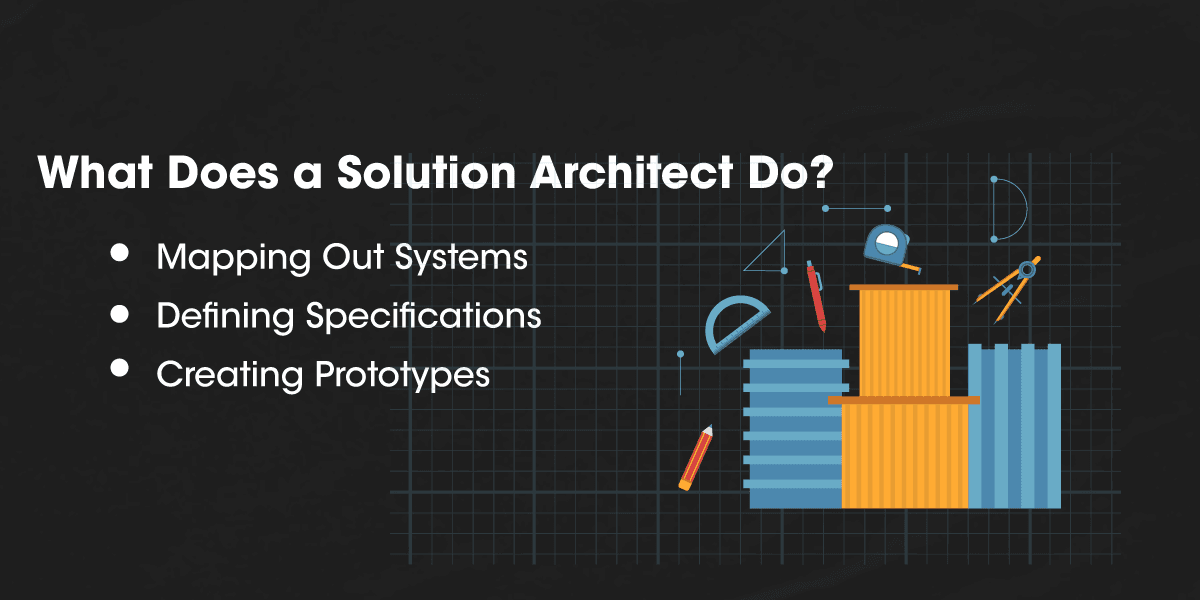
Designing Solutions
Solution Architects are responsible for creating detailed architectural blueprints for IT systems. This involves:
- Mapping Out Systems: Designing how different system components interact and integrate, such as software applications, databases, and network infrastructure.
- Defining Specifications: Outlining the technical requirements and constraints of the solution, including scalability, performance, security, and compliance.
- Creating Prototypes: Developing initial models or prototypes to test concepts and validate that they meet business needs before full-scale implementation.
These blueprints serve as a roadmap for the development team, ensuring that every aspect of the technology solution is aligned with the project's objectives and technical standards.
Collaborating
Collaboration is at the heart of a Solution Architect's role. They work closely with a diverse group of stakeholders to ensure the solution meets business requirements:
- Business Leaders: Engaging with executives and managers to understand their strategic goals and how technology can support them.
- Developers: Communicating technical requirements and design choices to development teams to ensure correct implementation.
- IT Teams: Coordinating with infrastructure and operations teams to ensure the solution integrates seamlessly with existing systems and processes.
- End Users: Gathering feedback from potential users to ensure the solution is user-friendly and meets their needs.
Effective collaboration ensures the solution is practical, feasible, and aligned with business and technical requirements.
Evaluating Technology
Solution Architects are tasked with assessing and selecting the right technologies for the project. This involves:
- Researching Options: Staying up-to-date with emerging technologies and industry trends to identify suitable solutions.
- Assessing Suitability: Evaluating various technologies based on criteria such as performance, cost, compatibility, and scalability.
- Vendor Selection: Choosing appropriate vendors or service providers if the solution involves third-party products or services.
This evaluation helps ensure that the technology stack chosen is optimal for the project's needs and constraints.
Overseeing Implementation
Once the design is finalized, Solution Architects play a crucial role in overseeing the implementation of the solution:
- Guiding Development: Providing ongoing support and guidance to development teams to ensure the solution is built according to the architectural design.
- Quality Assurance: Regular reviews and testing ensure the solution meets quality standards.
- Managing Changes: Addressing any modifications or adjustments needed during the implementation phase to accommodate new requirements or resolve issues.
Their oversight helps ensure the project stays on track and the final solution is delivered as planned.
Problem-Solving
During the implementation phase, Solution Architects are responsible for troubleshooting and resolving issues that arise:
- Identifying Issues: Diagnosing problems that occur during development or after deployment.
- Developing Solutions: Proposing and implementing fixes or adjustments to address technical challenges.
- Ensuring Continuity Means ensuring that any changes do not negatively impact the overall system and that the solution remains aligned with business goals.
Their problem-solving skills ensure the solution remains functional, reliable, and effective throughout its lifecycle.
Skills Required for a Solution Architect
To excel as a Solution Architect, you need diverse skills that span technical knowledge, problem-solving, and interpersonal abilities. Here’s a detailed look at the essential skills required for the role:
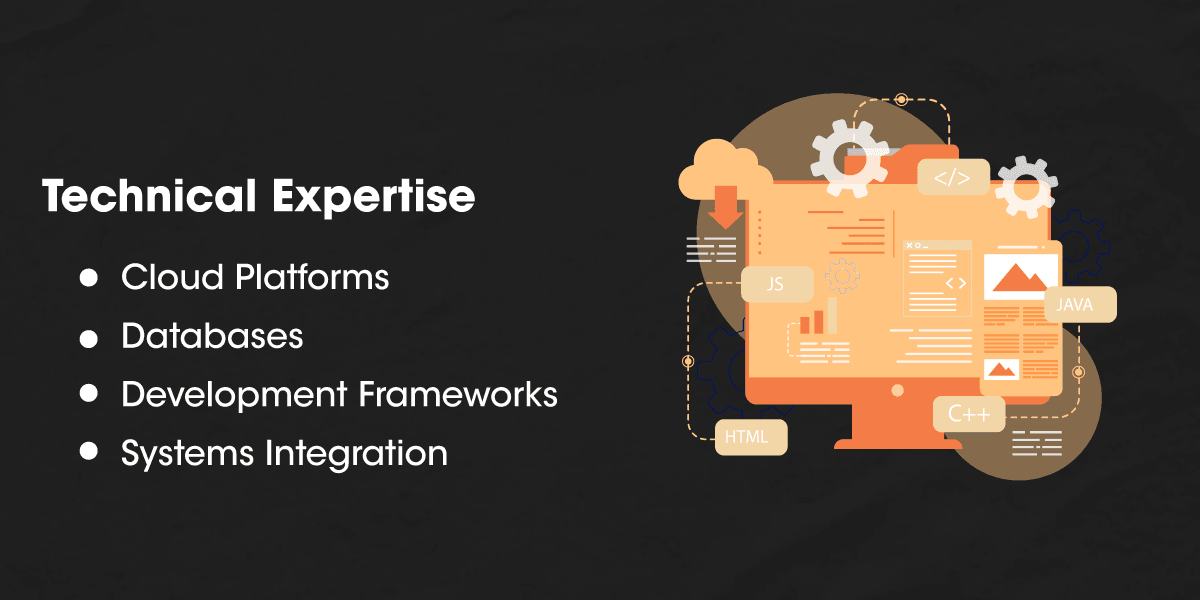
Technical Expertise
A Solution Architect must deeply understand various technologies to design effective IT solutions. This includes:
- Cloud Platforms: Proficiency in cloud computing services such as AWS, Microsoft Azure, or Google Cloud Platform. This involves understanding how to leverage cloud resources for scalability, reliability, and cost-effectiveness.
- Databases: Knowledge of different database technologies, including relational databases (SQL) and NoSQL databases. This expertise helps design data storage solutions optimized for performance and security.
- Development Frameworks: Familiarity with software development frameworks and tools, such as .NET, Java, or Python. This enables you to design robust, maintainable, and scalable applications.
- Systems Integration: Understanding how to integrate various systems and technologies to ensure seamless data flow and interoperability within the architecture.
This technical expertise allows Solution Architects to make informed decisions about designing and implementing IT solutions.
Analytical Skills
Solution Architects need strong analytical skills to tackle complex problems effectively. This involves:
- Problem Analysis: The ability to dissect intricate issues into manageable parts, identify root causes, and understand the implications for the overall system.
- Solution Design: Crafting innovative and practical solutions that address specific business needs while considering technical constraints and performance requirements.
- Performance Evaluation: Assessing the performance of systems and identifying areas for improvement or optimization to ensure the solution meets the required standards.
Analytical skills are crucial for developing solutions that are both effective and efficient.
Communication
Effective communication is vital for a Solution Architect, as the role involves interacting with various stakeholders. Key aspects include:
- Verbal Communication: Explain technical concepts, designs, and strategies to non-technical stakeholders, such as business leaders or clients, to ensure understanding and buy-in.
- Written Communication: Creating detailed documentation, including architectural diagrams, technical specifications, and project reports, that accurately convey complex information in an accessible manner.
- Stakeholder Engagement: Listening to and addressing the needs and concerns of stakeholders to align technology solutions with business objectives and ensure successful project outcomes.
Strong communication skills facilitate collaboration and ensure all parties are aligned on project goals and requirements.
Leadership
Leadership skills are essential for guiding teams and managing projects. This includes:
- Team Management: Leading and motivating cross-functional teams, including developers, engineers, and project managers, to execute the solution design effectively.
- Strategic Decision-Making: Making informed decisions that impact the project’s direction, including technology selection, resource allocation, and risk management.
- Mentoring and Support: Providing guidance and support to team members, helping them develop their skills and contribute effectively to the project.
Effective leadership ensures that the project progresses smoothly and that team members are engaged and productive.
Project Management
Project management skills are critical for ensuring that IT projects are completed successfully. This encompasses:
- Time Management: Planning and scheduling project activities to meet deadlines and manage project timelines efficiently.
- Budgeting: Managing project budgets by estimating costs, allocating resources, and controlling expenses to ensure the project remains within financial constraints.
- Risk Assessment: Identifying potential risks and developing strategies to mitigate them, ensuring that the project stays on track despite any challenges that may arise.
Strong project management skills help deliver projects on time, within budget, and to the desired quality.
Does a Solution Architect Do Coding?
While Solution Architects need to understand coding, their primary focus is not on writing code. Instead, they design the architecture and guide developers on how to implement it. They may occasionally write code to prototype solutions or solve specific issues, but coding is not their primary responsibility. Their role involves planning, designing, and ensuring all components work together seamlessly.
How Much Do Solution Architects Make?
Solution Architects are well-compensated for their expertise. Salaries can vary based on experience, location, and industry, but they generally earn high wages due to the critical nature of their work. On average, Solution Architects can earn between $100,000 and $150,000 per year, with the potential for higher earnings in specific industries or locations.
Solution Architect Job Description
A typical job description for a Solution Architect includes:
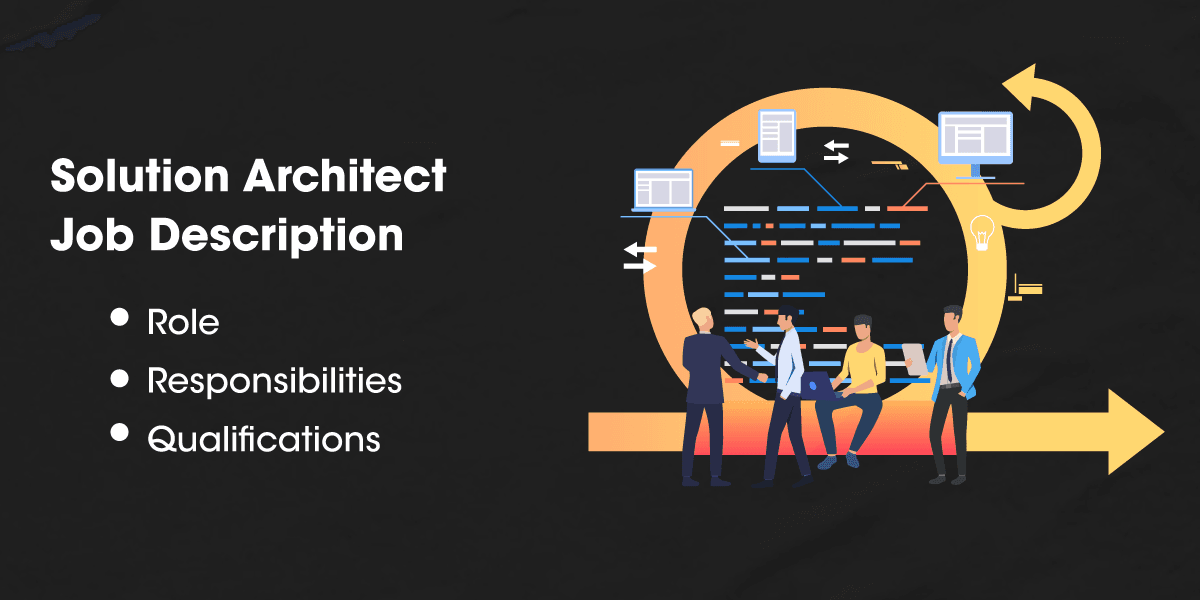
- Role: Design and implement IT solutions that align with business objectives.
- Responsibilities: Develop architectural blueprints to outline system components and interactions. Collaborate with business leaders, developers, and IT teams to gather requirements and ensure solutions meet business needs. Evaluate and recommend technologies and platforms that fit project requirements. Oversee the development and deployment of solutions, ensuring adherence to design and quality standards. Solve technical problems that arise during and after implementation.
- Qualifications: Strong technical expertise in IT systems, cloud platforms, and databases. Proven experience in IT project management and solution design. Excellent communication skills to convey technical concepts clearly to various stakeholders. Relevant certifications include TOGAF, AWS Certified Solutions Architect, or Microsoft Certified: Azure Solutions Architect Expert.
How to Become a Solution Architect?
Becoming a Solution Architect involves a combination of education, experience, skill development, and certifications. Follow these steps to pursue this career:
- Educational Background: Earn a degree in Computer Science, Information Technology, or a related field to build a solid foundation in technology and systems.
- Gain Experience: Accumulate experience in IT roles such as software development, system administration, or IT project management. This hands-on experience is crucial for understanding technical environments and project dynamics.
- Develop Skills:
- Architecture Design: Learn how to design complex IT systems and solutions.
- Project Management: Acquire project management skills, including time management, budgeting, and risk assessment.
- Communication: Enhance your ability to communicate technical concepts to technical and non-technical stakeholders.
- Pursue Certifications: Obtain certifications that validate your expertise and improve your credentials, such as TOGAF (The Open Group Architecture Framework), AWS Certified Solutions Architect, or Microsoft Certified: Azure Solutions Architect Expert.
- Apply for Roles: Look for positions that involve designing and implementing IT solutions. Entry-level or junior architect roles can help you gain the necessary experience to advance to more senior positions.
Solution Architect Certification
Certifications are crucial in enhancing your credibility and advancing your career as a Solution Architect. They provide formal validation of your skills and knowledge. Here are some highly regarded certifications:
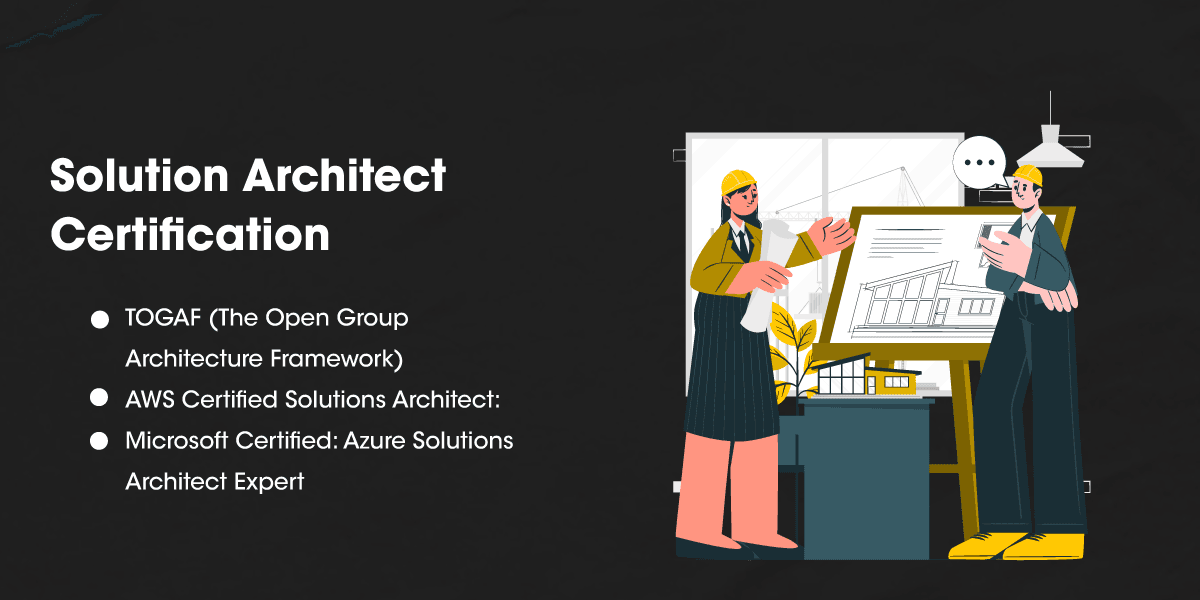
- TOGAF (The Open Group Architecture Framework): This certification offers a comprehensive approach to enterprise architecture. It helps you understand best practices and methodologies for designing, planning, and managing enterprise information systems aligning IT strategies with business objectives.
- AWS Certified Solutions Architect: This certification validates your expertise in designing and deploying scalable and cost-effective Amazon Web Services (AWS) systems. It also demonstrates your ability to work with AWS cloud services, which is essential for managing and creating cloud-based solutions.
- Microsoft Certified: Azure Solutions Architect Expert: This certification proves your proficiency in designing solutions on Microsoft Azure. It covers computing, networking, storage, and security aspects, showcasing your skills in leveraging Azure’s capabilities to build and manage cloud solutions.
These certifications are valuable for boosting your professional profile and effectively demonstrating your ability to handle complex IT architecture tasks.
Solution Architect Courses
To become a proficient Solution Architect, pursuing relevant courses is essential. These courses help you develop the necessary skills and knowledge across various domains. Here are key areas to focus on:
- Architectural Design Principles: Courses in this area cover the fundamentals of designing IT architectures, including best practices and frameworks for creating effective system designs.
- Cloud Computing: These courses provide insights into cloud platforms and services, such as AWS, Azure, and Google Cloud, essential for designing scalable and efficient cloud-based solutions.
- Project Management: Understanding project management principles helps in managing IT projects efficiently. Courses in this field cover project planning, execution, budgeting, and risk management.
- Technical Skills Development: Courses focusing on specific technical skills, such as programming, databases, and systems integration, are crucial for implementing and overseeing complex IT solutions.
Online platforms like Coursera, Udacity, and edX offer a range of courses and specializations in these areas. These platforms provide flexible learning options and high-quality content from industry experts to support your journey toward becoming a Solution Architect.
Conclusion
A Solution Architect is a crucial player in the IT field, responsible for designing and implementing technology solutions that drive business success. You can take informed steps toward becoming a Solution Architect by understanding the role, required skills, and career path. With the proper education, experience, and certifications, you can build a rewarding career in this dynamic field.

Marketing IBTI
#Marketing IBTI🇧🇷 Português
A IBTI é uma empresa de tecnologia com mais de 12 anos de experiência em desenvolvimento de sistemas, apps e soluções sob demanda. Atuamos no Brasil e no exterior com foco em qualidade, inovação e eficiência.
🇺🇸 English
IBTI is a tech company with over 12 years of experience developing custom software, apps, and IT-as-a-service solutions. We serve clients in Brazil and abroad, with a strong focus on quality, innovation, and efficiency.